This water-cooled chiller checklist can be used and completed throughout the project and its different stages covering:
- delivery,
- storage,
- installation &
- pre-commissioning/pre-functional
Once the pre-functional checks have been completed, the water-cooled chiller’s full functional testing/commissioning can be conducted.
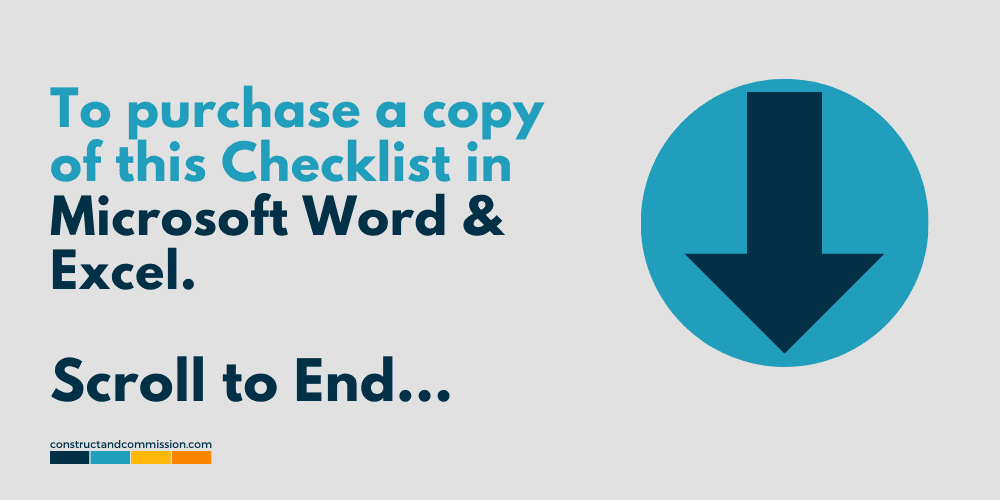
This checklist should be used and completed throughout the project, and its different stages, delivery, storage, installation & pre-commissioning, before the functional testing occurs.
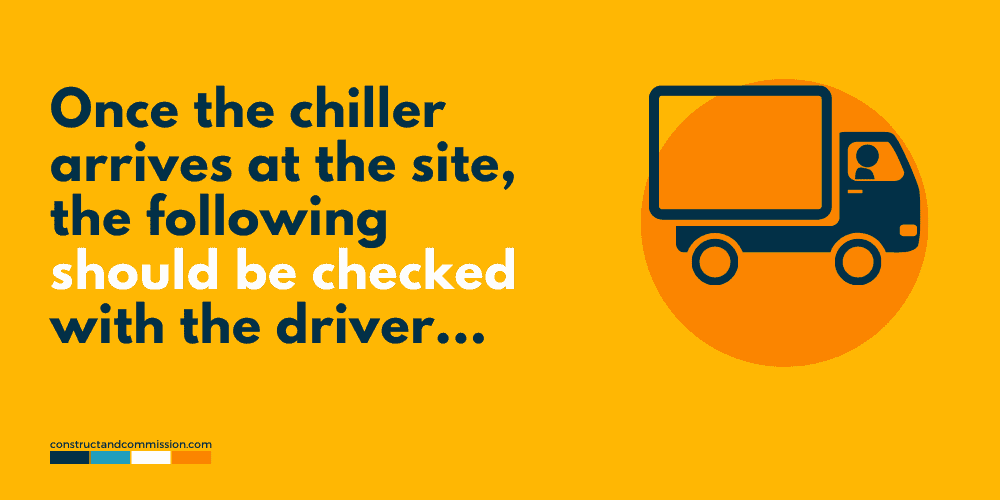
Delivery Inspection
Once the Water-Cooled Chiller arrives at the site, usually delivered by a transport company, and before being unloaded and accepted into storage, the following should be checked with the driver.
Any damage that is noted should be reported to the manufacturer/supplier immediately in writing supported with photographs.
| Ref | Inspection/Task |
|---|---|
| 1 | Supplier's consolidated delivery ticket is available, showing all equipment and ancillaries for inspection and being used to check against. |
| 2 | A copy of the order that was sent to the supplier is available for reference and is being used to check against |
| 3 | Equipment is packaged, protected, and crated in separate boxes, for maximum protection |
| 4 | The unit nameplate and technical details match the purchase order |
| 5 | Delivery protection is dry |
| 6 | Unit/s are dry internally |
| 7 | The external casing of the unit/s are undamaged |
| 8 | All frames, if ordered are included |
| 9 | All pipework connections are the correct size |
| 10 | Pipework connections are undamaged |
| 11 | All pipework handings are correct |
| 12 | All pipework is blanked for the protection of the coil. |
| 13 | All ancillaries [valves, actuators, sensors, flow meters, flow-switches, control panels, variable speed drive, vibration mounts/pads/brackets] are included in delivery as per the order and delivery note |
| 14 | Understand if the unit has been shipped charged with refrigerant or nitrogen. |
| 15 | Documentation included drawings [piping, wiring, etc., datasheets, manuals, etc. |
| 16 | Replace protection that has been removed |
| 17 | Lifting and material moving plan available and agreed to unload the water-cooled chiller from the trailer. |
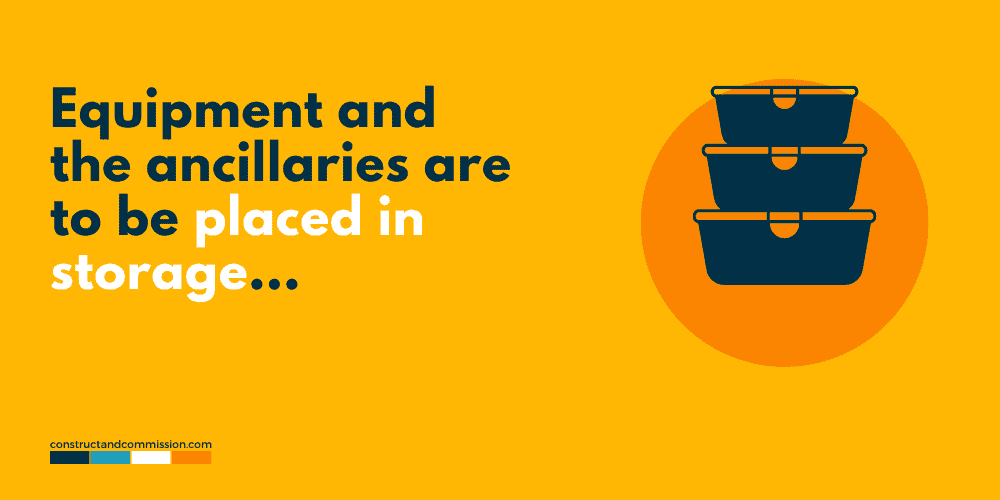
Storage Inspection
Storage Area
If the equipment is to be placed into storage on site prior to installation there will be an inspection completed checking the following.
| Ref | Inspection/Task |
|---|---|
| 1 | The area is internal and will not be affected by the weather. [if the unit is not rated for external use] |
| 2 | The surface where the equipment is to be placed is level. |
| 3 | The equipment will be raised from the floor to allow airflow and stop the risk of water ingress. |
| 4 | The area is well covered and protected. |
| 5 | The area is well ventilated and has no risk of high humidity. |
| 6 | The area is clean & dust-free. |
| 7 | The area is secure and protected from the movement of other materials and vehicles. |
| 8 | The temperature and humidity of the space has been checked and confirmed can be maintained in line with the manufacturers requirements. Check installation manual. |
Here is our open copy [MS Word] of the WATER COOLED CHILLER Pre-Functional Checklist, for making life a little easier...
We have also recently formatted this checklist to [MS Excel] and included it as a Bonus for FREE.
So get an MS Word & MS Excel for the same price.
Storage of Water-Cooled Chiller
Prior to the water-cooled chiller being placed into storage, the following should be checked.
| Ref | Inspection/Task |
|---|---|
| 1 | Water-cooled chillers will not have materials stacked on them. |
| 2 | All ancillaries will be placed in a safe and secure location, so items do not go missing or get damaged. |
| 3 | All original packaging is intact and not removed. |
| 4 | Pipework caps are not removed. |
| 5 | Water-cooled chiller and all components placed on a level surface. |
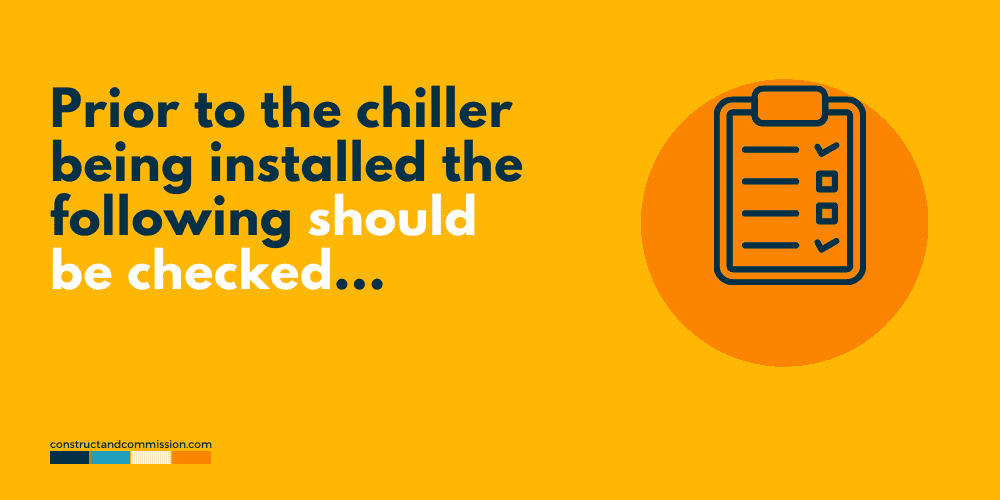
Pre-Installation Inspection
Prior to the units being installed the following should be checked.
| Ref | Inspection/Task |
|---|---|
| 1 | The plinth/base is ready, flat, and level & can bare the weight of the installation. |
| 2 | Ensure the slab/floor/plinth is finished in line with the requirements of the specification [painted etc.]. |
| 3 | Isolator pad mounts are installed and in the correct position |
| 4 | The room/area is dry and watertight. |
| 5 | The area being installed is not prone to flooding or ponding of water. |
| 6 | The room/area the water-cooled chiller will be installed into is clean and dust-free. If there is dust/construction work, then the water-cooled chiller should be protected. |
| 7 | The installation of the unit will not impede the installation of the condensate / chilled water/condensate trap/pipework. |
| 8 | All connections, pipework, etc., can be independently supported and not supported by the water-cooled chiller. The best practice is to install self-supporting brackets prior to the connection of the chiller from the floor. |
| 9 | Ensure that all access points/doors are clear and not blocked from brackets or other services. |
| 10 | Check to ensure that all connection kits containing - gaskets, bolts, cleats, screws are available to allow bolting up and mounting of the equipment. |
| 11 | Remove all transport feet and bolts. |
| 12 | Check that all required cabling can be run to the unit and on appropriate containment, not impeding access to the areas needed to gain access for maintenance and operation of the unit. |
| 13 | The temperature and humidity of the space has been checked and confirmed can be maintained in line with the manufacturers requirements. Check installation manual. |
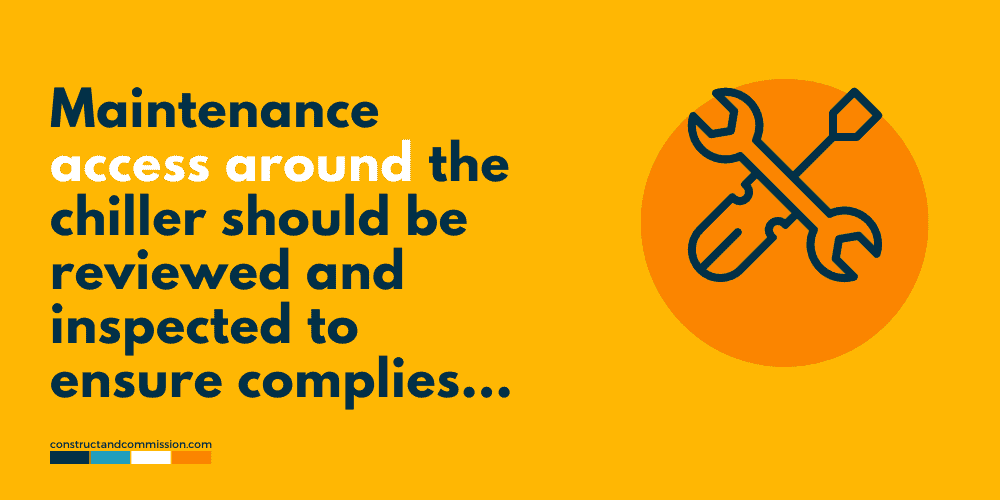
Maintenance/Access
| Ref | Inspection/Task |
|---|---|
| 1 | There is enough space allowed around and above the unit once installed to perform maintenance and remove components. [check the manufacturer's maintenance instructions for requirements] |
| 2 | All doors can be fully opened to gain access to the chiller and electrical components. |
| 3 | Check that there is enough space for coils the coils to be removed. |
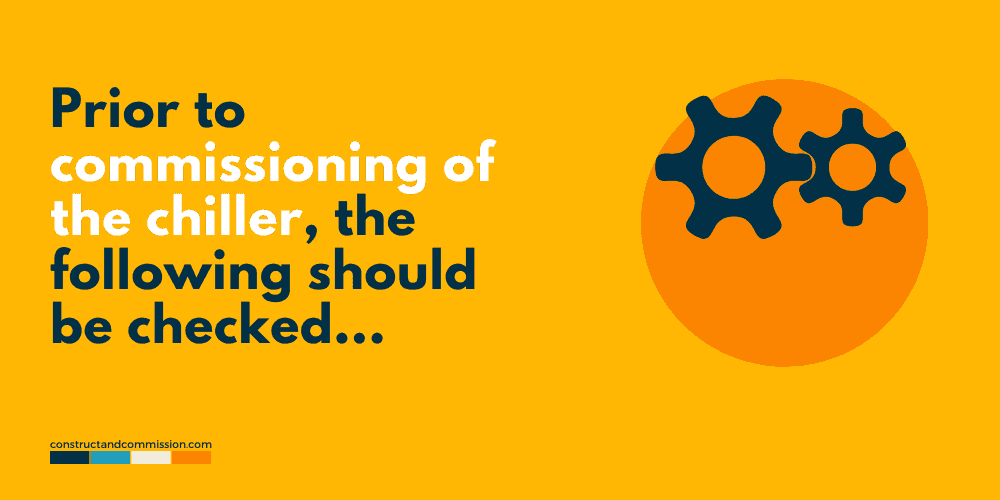
Pre-Commissioning Inspection
Once the water-cooled chiller has been installed and prior to the functional testing and commissioning phase taking place the following will be checked.
General
| Ref | Inspection/Task |
|---|---|
| 1 | Document the information of the unit from its nameplates and cross-reference with the specified information to ensure correct. |
| 2 | Checking: |
| 3 | a. ManufacturerModel |
| 4 | b. Serial number |
| 5 | c. Cooling capacity |
| 6 | d. Condenser fluid type |
| 7 | e. Condenser fluid flow rate |
| 8 | f. Chilled water fluid type |
| 9 | g. Chilled water flow rate |
| 10 | h. Refrigerant type |
| 11 | i. Compressor motor rating |
| 12 | j. Compressor motor voltage/phase/frequency |
| 13 | The water-cooled chiller is free from physical damage |
| 14 | All components are installed [cooler, condenser, compressor, motor, etc.] |
| 15 | Motor bearings are double sealed and permanently lubricated. |
| 16 | Ensure the unit is level with the deflection in line with the manufacturers requirements. |
| 17 | Ensure all isolator pads are installed correctly. |
| 18 | All spring isolators are installed if being used. |
| 19 | Seismic restraints, where required, installed. |
| 20 | Ensure each end cap of the chiller has been checked and verified as being tight by using a torque wrench for checking each bolt. |
| 21 | All-access doors can be opened and closed with no obstructions for general access and maintenance. |
| 22 | Unit and all components including valves and controls are labeled in line with the project naming convention. |
| 23 | Operation and startup manual for the water-cooled chiller available. |
| 24 | Manufacturing/dimensioned drawings available |
| 25 | The manufacturers installation check sheet was completed and issued to the manufacturer for the arrangement of the engineer. |
Evaporator Coil [Chilled Water Side]
| Ref | Inspection/Task |
|---|---|
| 1 | The coil is clean in good condition and the tubes are undamaged. |
| 2 | Ensure that the pipework is connected as per the design and the correct size. |
| 3 | Ensure that the flow and return pipework are piped correctly. |
| 4 | The installation of the pipework will not put stress on the equipment connections or create vibrations. |
| 5 | The materials used between the equipment and the chilled pipework system will not cause Electrolysis. |
| 6 | Pipework has been weld tested. |
| 7 | Pipework has been pressure tested. |
| 8 | Pipework has been cleaned and flushed. |
| 9 | Equipment has been backflushed. |
| 10 | The system has been bled and air removed. |
| 11 | The chilled water system has been hydraulically balanced. |
| 12 | Pipework is insulated and vapor sealed |
| 13 | Insulation is labeled |
| 14 | Strainer installed |
| 15 | Isolation valves installed. |
| 16 | Double regulating valves / commissioning stations installed |
| 17 | Pressure gauges installed, and display scale as per design requirements. |
| 18 | Temperature gauges installed, and display scale as per design requirements. |
| 19 | Digital temperature sensors installed and connected to BMS / controls system |
| 20 | Test points installed. |
| 21 | Air vents installed. |
| 22 | Flexible connections installed between chiller and pipework. |
| 23 | Drain points installed and correct sizes. |
| 24 | Pipework connections are aligned with the chiller connections, not putting any stress on the system. |
| 25 | Differential pressure switch installed across the evaporator supply and return of the chiller. |
| 26 | All valves/control valves/flow switches are installed and in the correct direction |
| 27 | The piping layout and instruments match the approved construction drawing. |
| 28 | Chilled water pumps are commissioned and available. |
| 29 | The system can flow the correct amount of water for the chiller to be commissioned. |
| 30 | There is enough load to allow the chiller to run. |
Condenser Coil [Condenser Side]
| Ref | Inspection/Task |
|---|---|
| 1 | The coil is clean in good condition and the tubes are undamaged. |
| 2 | Ensure that the pipework is connected and the correct size. |
| 3 | Ensure that the flow and return pipework are piped correctly. |
| 4 | The installation of the pipework will not put stress on the equipment connections or create vibrations. |
| 5 | The materials used between the equipment and the condenser pipework system will not cause Electrolysis. |
| 6 | Pipework has been weld tested. |
| 7 | Pipework has been pressure tested. |
| 8 | Pipework has been cleaned and flushed. |
| 9 | Equipment has been backflushed. |
| 10 | The system has been bled and air removed. |
| 11 | The condenser water system has been hydraulically balanced. |
| 12 | Pipework is insulated and vapor sealed. |
| 13 | Insulation is labeled. |
| 14 | Strainer installed. |
| 15 | Isolation valves installed. |
| 16 | Double regulating valves / commissioning stations installed |
| 17 | Pressure gauges installed, and display scale as per design requirements. |
| 18 | Temperature gauges installed, and display scale as per design requirements. |
| 19 | Digital temperature sensors installed and connected to BMS / controls system |
| 20 | Test points installed. |
| 21 | Air vents installed. |
| 22 | Flexible connections installed between chiller and pipework. |
| 23 | Drain points installed and correct sizes. |
| 24 | Pipework connections are aligned with the chiller connections, not putting any stress on the system. |
| 25 | Differential pressure switch installed across the condenser supply and return of the chiller. |
| 26 | All valves/control valves/flow switches are installed and in the correct direction |
| 27 | The piping layout and instruments match the approved construction drawing. |
| 28 | Condenser pumps are commissioned and available |
| 29 | Cooling towers are commissioned and available, or able to operate. |
| 30 | Makeup water/fill system available and operating for the condenser system. |
| 31 | The system can flow the correct amount of water for the chiller to be commissioned. |
Refrigerant
| Ref | Inspection/Task |
|---|---|
| 1 | The unit has been pressure tested, evacuated, dehydrated, and charged. |
| 2 | The refrigerant has been charged and is in line with the manufacturer's requirements. |
We have created this bundle to consolidate all the Equipment Pre-Commissioning and Maintenance Checklists that are available across the site.
The checklists are provided in Microsoft Word and Excel.
Refrigerant Relief Piping
For water-cooled chillers, refrigerant relief piping is connected to the condenser and evaporator and runs to the atmosphere. This is required by code as a safety measure in case there is an over-pressurization of refrigerant gas and needs to be vented, it is run to the atmosphere due to the potential health and safety risk.
| Ref | Inspection/Task |
|---|---|
| 1 | Pipework is sized correctly in line with the design, code, ANSI/ASHRAE-15, and manufacturer's requirements. |
| 2 | Ensure that the pipework is connected and aligned correctly, with no evidence of horizontal misalignment, vertical offset, or compression. |
| 3 | Pipework connected to the relief valves on the condenser and evaporator |
| 4 | A dirt/condensation trap has been installed at the bottom of the vertical leg. |
| 5 | Flexible connections have been installed in the pipework, prior to the connection on the chiller. |
| 6 | The installation of the pipework will not put stress on the equipment connections or create vibrations. |
| 7 | Pipework exits the room to the atmosphere and discharges safely |
Condensate drains
| Ref | Inspection/Task |
|---|---|
| 1 | The condensate is installed to the correct fall. |
| 2 | Ensure is protected from any frost with insulation and/or heating cable. |
| 3 | There is a trap installed and is installed in line with manufacturer's requirements. [Check manufacturers instructions for calculation/requirements] |
| 4 | If there are multiple coils installed on a unit, ensure the condensate pipework configuration is installed in line with the manufacturers requirements. |
| 5 | Check that the size of the condensate is correct. |
| 6 | Ensure the trap is filled to the correct level. |
| 7 | Ensure the drain pan is clean and free of debris |
Electrical General
| Ref | Inspection/Task |
|---|---|
| 1 | Unit and components are fully earthed in line with the manufacturers instructions. |
| 2 | Earthing has been tested |
| 3 | Emergency disconnect installed for each component in line with NFPA/local code requirements |
| 4 | Electrical voltage from the site matches the unit required voltages. |
| 5 | All cabling is installed and connected on the correct containment/raceways and not damaged. |
| 6 | All cabling has been tested/torque tested. |
| 7 | A local motor control panel [LMCP] has been installed |
| 8 | The local motor control panel has been electrically tested |
| 9 | All electrical cabling is labeled in line with the project naming convention. |
| 10 | Power available |
| 11 | Wiring diagrams available |
Variable Speed Drive
| Ref | Inspection/Task |
|---|---|
| 1 | A variable speed drive has been installed. |
| 2 | Variable Speed Drive [VSD] has been electrically tested |
| 3 | Variable speed drive has been functionally tested |
| 4 | Main power supply available. |
Field Instrumentation
| Ref | Inspection/Task |
|---|---|
| 1 | Ensure all sensors and instruments are installed as per the control logic/manufacturers wiring drawings |
| 2 | All sensors are calibrated |
Controller
| Ref | Inspection/Task |
|---|---|
| 1 | Control wiring completed from instruments and interlocks in accordance with the manufacturer's wiring diagram. |
| 2 | Power available to control panel. |
Water-Cooled Chiller Pre-Functional Testing checklist [pdf]
To help us expand the site and create more resources, we have created the below documentation in [Microsoft Word] + [Microsoft Excel] for download.
Click the ‘Buy Here‘ button to purchase the fully editable copy of the document below, which can be used straight away.
You will direct to our shop page.
Water Cooled Chiller Pre-Functional Checklist [Microsoft Word]
Water Cooled Chiller Pre-Functional Checklist [Microsoft Excel]
⬛ Related Articles
SPRINKLER PIPEWORK | Pre-Commissioning Checklist
COOLING TOWER | Preventative Maintenance Inspections
CRAH UNIT | Pre-Functional CheckList
AIR HANDLING UNIT | Pre-Commissioning Inspection Checklists
AIR-COOLED CHILLER | Pre-Functional Checklist Template + Download
DATA CENTER | Commissioning Checklist


![Water Cooled Chiller Pre-Functional Checklist Template [MS Word] + [MS Excel]](https://constructandcommission.com/wp-content/uploads/2022/04/049c-Water-Cooled-Chiller-Pre-Functional-Checklist-Sell.webp)
![19No. Site Equipment / Maintenance Checklists [MS Word] [MS Excel]](https://constructandcommission.com/wp-content/uploads/2023/05/000f-All-Checklist-Bundle.webp)